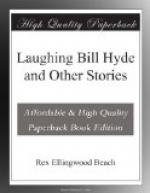Friendships ripen and enmities deepen quickly on the trail, seeds of discord sprout and flourish in the cold. Folsom’s burst of temper had served to inflame a mutual dislike, and as he and Harkness journeyed northward that dislike deepened into something akin to hatred, for the men shared the same bed, drank from the same pot, endured the same exasperations. Nothing except their hope of mutual profit held them together. In our careless search for cause and effect we are accustomed to attribute important issues to important happenings, amazing consequences to amazing deeds; as a matter of fact it is the trivial action, the little thing, the thing unnoticed and forgotten which bends our pathways and makes or breaks us.
Harkness was a hare-brained, irresponsible person, incapable of steadiness in thought or action, too weak to cherish actual hatred, too changeable to nurse a lasting grudge. It is with such frail instruments that prankish fate delights to work, and, although he never suspected it, the luxury of yielding to that sudden gust of passion cost Folsom dear.
Arrived finally at the Kobuk the miner examined the properties covered by his option, and impressed by the optimism of the men who had made the gold discovery he paid Harkness the price agreed upon. The deal completed, he sent the fellow back to Candle Creek, the nearest post, for supplies. Folsom’s mood had altogether changed by now, so, strangling his last doubt of Lois, he wrote her as he had written at Kougarok City, and intrusted the letter to his associate.
Harkness, promptly upon his arrival at Candle, got drunk. He stayed drunk for three days, and it was not until he was well started on his way back to the Kobuk that he discovered Folsom’s letter still in his pocket.
Now, to repeat, the man was not malicious, neither was he bad, but as he debated whether he should back-track there came to him the memory of his humiliation on the Imnachuck divide.
So! His brains were in his feet, eh? Folsom had strangled him until he kicked, when, all the time, they had been on the right trail. Harkness felt a flash of rage, like the flare of loose gunpowder, and in the heat of it he tore the letter to atoms. It was a womanish, spiteful thing to do, and he regretted it, but later when he greeted the husband he lied circumstantially and declared he had given the missive into the hands of the mail-carrier on the very hour of his departure. By this time, doubtless, it was nearly to Nome. Soon thereafter Harkness forgot all about the incident.
Folsom was a fast worker. He hired men and cross-cut the most promising claim. Bed-rock was shallow, and he soon proved it to be barren, so he went on to the next property. When he had prospected this claim with no better results than before he wrote his wife confessing doubts of the district and voicing the fear that his winter’s work would be wasted. Again he let his pen run as it would; the letter he gave to a neighbor who was leaving for Candle Creek in the morning.




